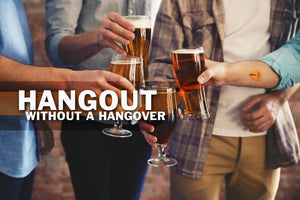How to Avoid a Hangover
A hangover is a collection of unpleasant physical and mental symptoms that can occur after consuming too much alcohol. These symptoms can range from a headache and nausea to fatigue, difficulty concentrating, and irritability. While it is not possible to completely cure or prevent a hangover, there are several proven methods that may help alleviate or reduce the risk of experiencing these unpleasant symptoms. While there is no surefire way to completely prevent a hangover, there are a few proven methods that may help reduce the risk of experiencing one.
Drink in moderation: The most effective way to prevent a hangover is to drink in moderation. This means limiting your alcohol consumption to one drink per day for women and two drinks per day for men. It is also important to drink alcohol slowly and to have non-alcoholic beverages in between alcoholic drinks.
Stay hydrated: As alcohol is a diuretic that can increase urine production and lead to fluid loss, it is important to drink plenty of water before, during, and after drinking alcohol. This can help prevent dehydration, which can contribute to hangover symptoms.
Eat a balanced meal before drinking: Eating a balanced meal before drinking can help slow the absorption of alcohol into your bloodstream and can reduce the risk of a hangover. Foods that are high in protein and complex carbohydrates, such as nuts, cheese, and whole grain crackers, can be especially helpful.
Avoid drinks that are high in congeners: Congeners are chemical compounds that are found in some alcoholic beverages and are thought to contribute to hangovers. Drinks that are high in congeners, such as red wine and whiskey, may increase the risk of a hangover. Light-colored drinks, such as vodka and white wine, generally have fewer congeners and may be less likely to cause a hangover.
Alternate alcoholic and non-alcoholic drinks: Alternating between alcoholic and non-alcoholic drinks can help you stay hydrated and may reduce the risk of a hangover. Water, juice, and sports drinks can all be good choices for non-alcoholic beverages.
Avoid drinking on an empty stomach: Drinking alcohol on an empty stomach can increase the risk of a hangover as it allows the alcohol to be absorbed more quickly into the bloodstream. To reduce the risk of a hangover, try to eat a light meal before or while drinking.
Get a good night’s sleep: Getting a good night’s sleep can help your body recover from the effects of alcohol and can reduce the risk of a hangover. If you are unable to sleep, try taking a short nap or just lying down and relaxing.
In conclusion, while there is no surefire way to completely prevent a hangover, there are a few proven methods that may help reduce the risk of experiencing one. These include drinking in moderation, staying hydrated, eating a balanced meal before drinking, avoiding drinks that are high in congeners, alternating alcoholic and non-alcoholic drinks, avoiding drinking on an empty stomach, and getting a good night’s sleep. By following these tips, you can help reduce your risk of experiencing a hangover and enjoy a night out without feeling too rough the next day. Remember to always drink responsibly and to never drink and drive.


